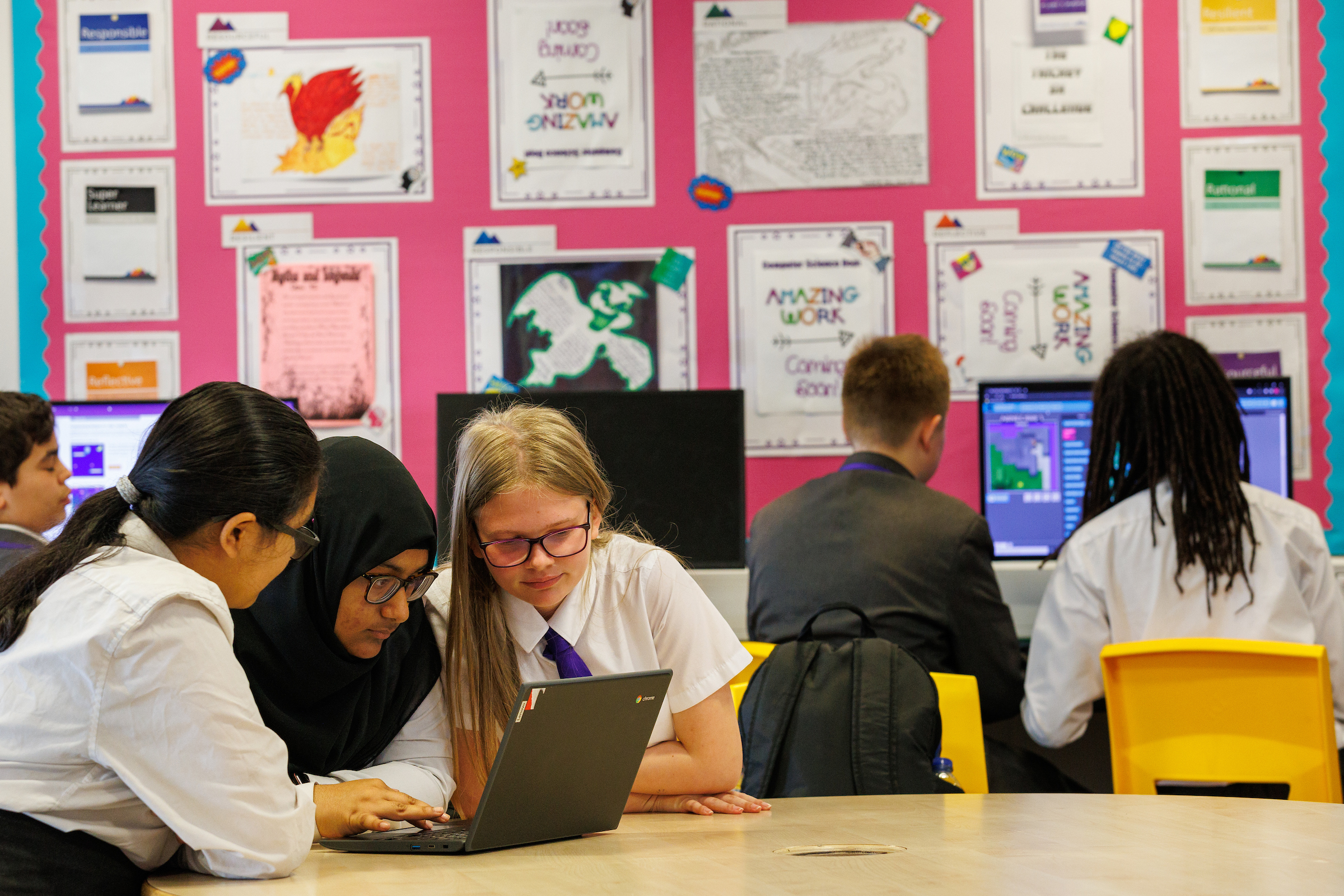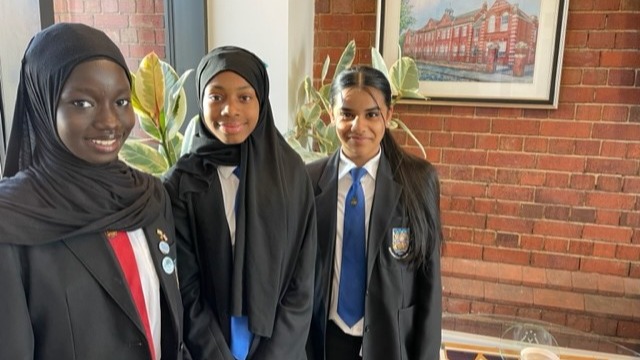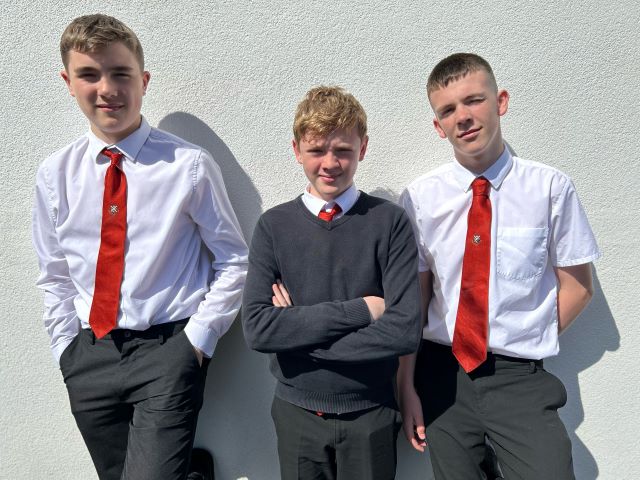Making computing more meaningful through independent learning

A 2023 impact journey case study
According to Mark Smith, CEO of Ada, the National College for Digital Skills (FE Week), ‘Over half of secondary schools in the UK were not even offering computer science as a GCSE in 2021, and the number of 14-to-19 students taking technical IT or computing qualifications has fallen by one-third since 2015.’ For those who are taking computing, Schools Week reported a 28.6% drop in GCSE computing grades from 2022-23 – it’s clear something needs to change if we’re going to level the playing field.
Teach First’s Steminism report highlights that it’s not just the number of students taking STEM subjects that is problematic, it’s also a matter of diversity and representation in both the GCSE curriculum and STEM careers. Despite girls performing just as well – if not better than boys in STEM subjects at school – just 13% of STEM workers at management level are women, which is hugely detrimental to the economy and to society.
The House of Commons Committee report, Diversity and Inclusion in STEM highlights that ‘children’s experiences in the classroom shape their life choices and outcomes, which in turn shape the composition and diversity of the workforce’. It recommends that ‘the education and research sectors must follow the Government’s lead and take a systemic approach to the challenge, making the STEM ecosystem in the UK a beacon of good practice when it comes to addressing under-representation.’
With a clear need for action, it’s vital that we encourage more girls and others from underrepresented groups to study computing at school, ultimately helping to build a more diverse STEM workforce. A recent interview with Mr Christie, a teacher at St Paul’s RC Academy, confirmed this is happening in their school. He said, “You can see that older girls have heard about what the younger team is doing (Apps for Good), and they want to get in on the action as well. So it's brilliant. One of my aims is to try and bring more girls into the computing department and Apps for Good has really helped with that”.
How do we make a difference?
It’s important that students believe they can make a difference to their own lives and communities, and it’s evident in feedback from our students and teachers that young people are empowered by solving problems they care about. We support them to design digital tech solutions that are relevant to them and that will change their world for the better.
Our courses encourage students to be creative and gain independence in their learning – this can either be individually or working as pairs or as part of a team. We encourage a ‘growth mindset’ to positively tackle issues around climate change and social action, which can ease anxiety around challenging themes, but also motivates students to find solutions. After leading his class through Innovate for Climate Change, Mr Coakley from Kempston Academy said, “Students stopped looking at my screen and led their own learning.”
We also use industry approaches with students, such as design thinking and encourage them to use problem statements to think through who their app will help and why it’s important to address the issue.
One of the things we’re most proud of is how powerful it is when young people are encouraged to bring their lived experiences into their app development ideas – something we see in the ‘real-life’ tech for good founders we feature in our courses to inspire our young innovators. This is brought to life through our annual Showcase, which attracted entries from 153 teams in 2023, of which 73% were from schools in challenging circumstances. Our research shows that 71% of students who entered Showcase are more interested in getting involved in taking social action.
For staff it is rewarding seeing the students flourish, coming up with their own ideas and running it as I step back. I occasionally gave a prompt or guide, but by large, it allowed their independence to blossom and grow across the course of the programme.”
Richard Gledhill, Teacher, Dr. Challoners Grammar School
Here are just a few of the app ideas, inspired by lived experience of young people:
Never Forget
Never Forget is a digital friend for carers of people living with dementia. The app was created by students aged 13-15 from West Bromwich Collegiate Academy.
The idea was inspired by one of the students whose mum needed support to care for their Gran. One of the students said:
"My mum was at a loss of how to help her and there was very little support from doctors or any other services... Awful things would happen like putting Vanish stain remover in her tea and my mum felt at a loss at how to prevent these things from happening.”
The students recognised that Gran also needed support and, due to the nature of dementia, that it can also be quite a scary process for the patient. They recognised that she might need support and advice herself without having to rely on family.
The team came up with an AI-enabled app which gives people a place where they can show their feelings and explain why they are feeling that way. It gives them access to an AI chatbot for advice and helpful links. The app offers users information on how to deal with dementia and how to support the wellbeing of family members or friends.
When users press the mood page, it sends them to a screen where they can share their feelings and it will show a reassuring message. If they press the tip’n’chat, they will be able to talk to an AI chatbot about their feelings and ask for advice. The support page will show helpful links and the settings will help the customer change the app for their preferences.
Sanitary

Rokhaya, Haajar, and Seher, all aged 13 from Shireland Collegiate Academy created Sanitary to tackle period poverty. It is aimed at women and girls in the UK who don't have access to sanitary products. The girls said:
“We are dealing with a substantial and severe issue in the world that affects lots of people, and this must be resolved. So, we want to ensure that the stigma is brought to the surface, and using technology is the perfect way to do this.”
As a group of females, the team could empathise with other women and girls who cannot afford sanitary products or struggle to find them. They know how it feels to menstruate and understand that it can be challenging when not supplied with the essential products needed.
They designed their app for females who have barriers to accessing essential sanitary products. It helps women to get the necessary sanitary products for free in an emergency. Users would identify their location, and inform them of the nearest establishment that sells the products they need. The app will produce a barcode that can be used for payment at the till and the shop's finance system tracks this back to the affiliated charity which will pay for the item(s).
Paw Print

Inspired by their own pets, Paw Print is the creation of Noah (13), David (12), and Liam (12) from Dunoon Grammar School. After a bit of research the team were alarmed at how pet owners are damaging the environment, often because they don't know any better. According to the boys, “feeding dogs and cats creates the equivalent of around 64 million tons of carbon dioxide in the US each year. That’s roughly the same impact as 13.6 million cars on the road!” They put their heads together and thought about what was within their control to change.
“The Apps for Good course made us think of a range of factors that contribute to the climate crisis. We often think it’s largely down to big business and industry - but it made us think closer to home about things we have direct control over.”
The team came up with an app that provided a fun way to care for your pet, while caring for the planet. Paw Print enables you to create a virtual version of your actual pet who will give advice on how to look after the planet better. You can earn rewards for following this advice - which you can use in the real or virtual world, and users are encouraged to return by competing in virtual pet shows.